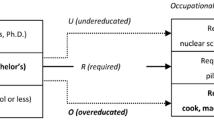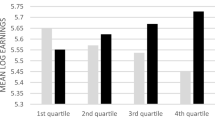Abstract
This study explores the persistent effect of graduating from university in a recession on earnings and sheds light on underlying mechanisms focusing on the roles of educational mismatch and job instability. Using longitudinal data from South Korea, we estimate the short- and long-term effects of the unemployment rate in the province where the university is located at the time of graduation on labor market outcomes. The IV estimation results show that a 1% point increase in the unemployment rate at graduation decreases the initial monthly earnings by 8.77% and the earnings loss is persistent. A 1% point increase in the unemployment rate also increases the probability that the level of education required for work is lower than the university level by 7.58% points and the probability of being a temporary worker by 8.54% points. When the educational mismatch and job instability are accounted for, the magnitude of the initial earnings loss due to graduating from university in a recession decreases by 40.9%. Our results suggest that skill mismatch and job instability are important mechanisms through which entering a labor market in a recession has negative impacts on labor market outcomes for a considerable period after labor market entry.







Similar content being viewed by others
Data and code availability
The data and STATA codes used in the analysis are available upon request.
Notes
OECD (2021), Population with tertiary education (indicator). doi: 10.1787/0b8f90e9-en (Accessed on 19 April 2021).
Our data shows that 41.0% of women graduate later than expected and 60.9% of men graduate later than expected. We infer the reasons as follows. As there are cases where men’s military enlistment time does not coincide with the end of the semester at university, some male students inevitably take one more semester off in the situations. As a result, graduation could be delayed. Male students may need more time to re-learn the skills required in the labor market, as their studies at university are interrupted by military service.
Among the control variables, the province of current residence and the regional unemployment rate in the survey year are determined after university graduation. When the fixed effects of the province of current residence are not controlled for, the IV estimate is \(-0.0835\) (SE: 0.080). When the regional unemployment rate in the survey year is not controlled for, the IV estimate is \(-0.0886\) (SE: 0.0275).
As labor market conditions at university graduation affect the employment probability after graduation, the composition of workers can also varies depending on the labor market conditions. The effect of the unemployment rate at university graduation on earnings may reflects the composition effect. Although the composition effect may have a partial effect, we believe that it does not fully account for the effect on earnings. While the initial earnings penalty for the unlucky cohort may be explained by selectively delaying graduation by those who want to work in high-paying jobs, the persistency of the earnings penalty seems difficult to be explained: this is because, if people who want to work in high-paying jobs belonging to the unlucky cohort find the job within a few years, the earnings penalty should be completely eliminated from then after controlling for experience and job tenure. In addition, the employment rate of unlucky cohorts was significantly lower in the first two years after labor market entry, but there was no significant difference thereafter.
A job with skill mismatch is more likely to be unstable than a job without skill mismatch, and the level of education required for a temporary job may not be high, so skill mismatch is more likely to occur in temporary jobs. If this is true, the portions where the two variables account for the earnings loss could overlap. Assuming that the OLS estimates are the causal effects of job instability and educational mismatch, job instability alone accounts for 25.51% of the earnings loss, and educational mismatch alone accounts for 15.3%. The sum of the respective effects is 40.81%, which is not much different from the share (40.87%) that is accounted for when both variables are controlled. Educational mismatch and job instability each appear to independently account for a significant share of the earnings loss.
References
Altonji JG, Kahn LB, Speer JD (2016) Cashier or consultant? entry labor market conditions, field of study, and career success. J Labor Econ 34(1):S361–S401. https://doi.org/10.1086/682938
Becker SO, Woessmann L (2009) Was weber wrong? a human capital theory of protestant economic history. Q J Econ 124(2):531–596
Blundell R, Dias MC, Joyce R, Xu X (2020) COVID-19 and inequalities. Fiscal Stud 41:291–319. https://doi.org/10.1111/1475-5890.12232
Brunner B, Kuhn A (2014) The impact of labor market entry conditions on initial job assignment and wages. J Popul Econ 27:705–738. https://doi.org/10.1007/s00148-013-0494-4
Chae C (2016) Actual status and policy task of graduation postponement. KRIVET Issue Brief 108
Choi EJ, Choi J, Son H (2020) The long-term effects of labor market entry in a recession: Evidence from the asian financial crisis. Labour Econ 67:101926. https://doi.org/10.1016/j.labeco.2020.101926
Cockx B, Ghirelli C (2016) Scars of recessions in a rigid labor market. Labour Econ 41:162–176. https://doi.org/10.1016/j.labeco.2016.05.009
Dolton PJ, Vignoles A (2000) The incidence and effects of overeducation in the UK graduate labour market. Econ Educ Rev 19(2):179–198. https://doi.org/10.1016/S0272-7757(97)00036-8
Genda Y, Kondo A, Ohta S (2010) Long-term effects of a recession at labor market entry in japan and the united states. J Hum Resour 45(1):157–196. https://doi.org/10.3368/jhr.45.1.157
Groot W, Van Den Brink HM (2000) Overeducation in the labor market: a meta-analysis. Econ Educ Rev 19(2):149–158. https://doi.org/10.1016/S0272-7757(99)00057-6
Kahn L (2010) The long-term labor market consequences of graduating from college in a bad economy. Labour Econ 17(2):303–316. https://doi.org/10.1016/j.labeco.2009.09.002
Kim T (2021) Age culture, school-entry cutoff, and the choices of birth month and school-entry timing in South Korea. J. Demogr Econ 87(1):33–65. https://doi.org/10.1017/dem.2020.16
Kim T (2021) Estimating pecuniary and non-pecuniary returns to college education for academically marginal students: Evidence from the college enrollment quota policy in south korea. Econ Educ Rev 83:102142. https://doi.org/10.1016/j.econedurev.2021.102142
Kim T, Jang H, Kim J (2022) Do peers affect private tutoring engagement in Korea? evidence from a quasi-experimental approach. Asia Pac Educ Rev. https://doi.org/10.1007/s12564-021-09738-1
Kwon I, Milgrom EM, Hwang S (2010) Cohort effects in promotions and wages evidence from sweden and the united states. J Hum Resour 45(3):772–808. https://doi.org/10.3368/jhr.45.3.772
Lehrer S, Penney J, Pan AY (2022) Does Migration Reduce the Wage Penalty from Graduating College in a Recession? Evidence from Atlantic Canada. FutureSkills Research Lab. http://futureskillscanada.com
Liu K, Salvanes KG, Sorensen EO (2016) Good skills in bad times: Cyclical skill mismatch and the long-term effects of graduating in a recession. Eur Econ Rev 84:3–17. https://doi.org/10.1016/j.euroecorev.2015.08.015
McGuinness S (2006) Overeducation in the labour market. J Econ Surv 20(3):387–418. https://doi.org/10.1111/j.0950-0804.2006.00284.x
Moon WS (2009) Explaining the Cyclical Behavior of the Korean Labor Market. In: Annual academic conference proceedings (June 2008), Korea Money and Finance Association
Neumark D (2006) Youth labor markets in the united states: Shopping around vs. staying put. Rev Econ Stat 84(3):462–482. https://doi.org/10.1162/003465302320259475
Oreopoulos P, Wachter TV, Heisz A (2012) The short-and long-term career effects of graduating in a recession. Am Econ J-Appl Econ 4(1):1–29. https://doi.org/10.1257/app.4.1.1
Rothstein J (2021) The lost generation? Labor market outcomes for post great recession entrants. J Hum Resour 0920-11206R1
Schwandt H, Wachter TV (2019) Unlucky cohorts: Estimating the long-term effects of entering the labor market in a recession in large cross-sectional data sets. J Labor Econ 37:S161–S198. https://doi.org/10.1086/701046
Wachter TV (2020) The persistent effects of initial labor market conditions for young adults and their sources. J Econ Pespect 34(4):168–194. https://doi.org/10.1257/jep.34.4.168
Wachter TV, Bender S (2006) In the right place at the wrong time: The role of firms and luck in young workers’ careers. Am Econ Rev 96(5):142–149. https://doi.org/10.1257/aer.96.5.1679
Author information
Authors and Affiliations
Corresponding author
Ethics declarations
Conflict of interest
The authors declare that we have no conflict of interest. All results in this paper are from authors’ independent research.
Ethical approval
This article does not contain any studies with human participants performed by any of the authors.
Additional information
Publisher's Note
Springer Nature remains neutral with regard to jurisdictional claims in published maps and institutional affiliations.
This research was supported by the Daegu University Research Grant, 2018 .
Rights and permissions
About this article
Cite this article
Bae, Y., Kim, T. The labor market impacts of graduating from university during a recession: evidence and mechanisms. Empir Econ 64, 931–958 (2023). https://doi.org/10.1007/s00181-022-02260-2
Received:
Accepted:
Published:
Issue Date:
DOI: https://doi.org/10.1007/s00181-022-02260-2




